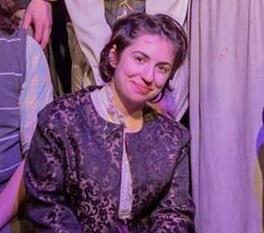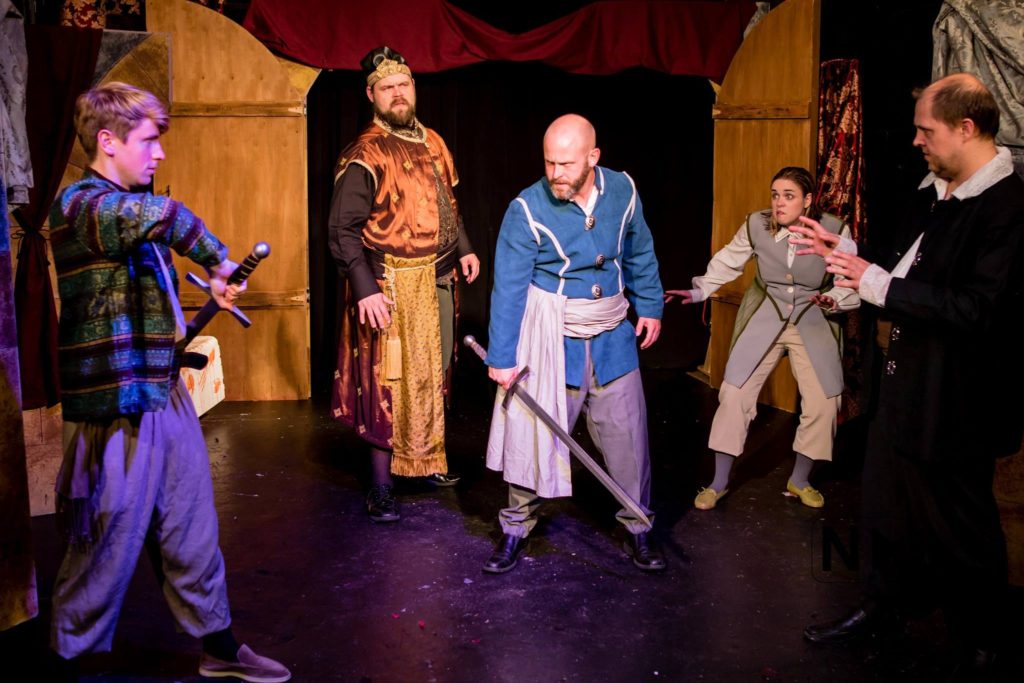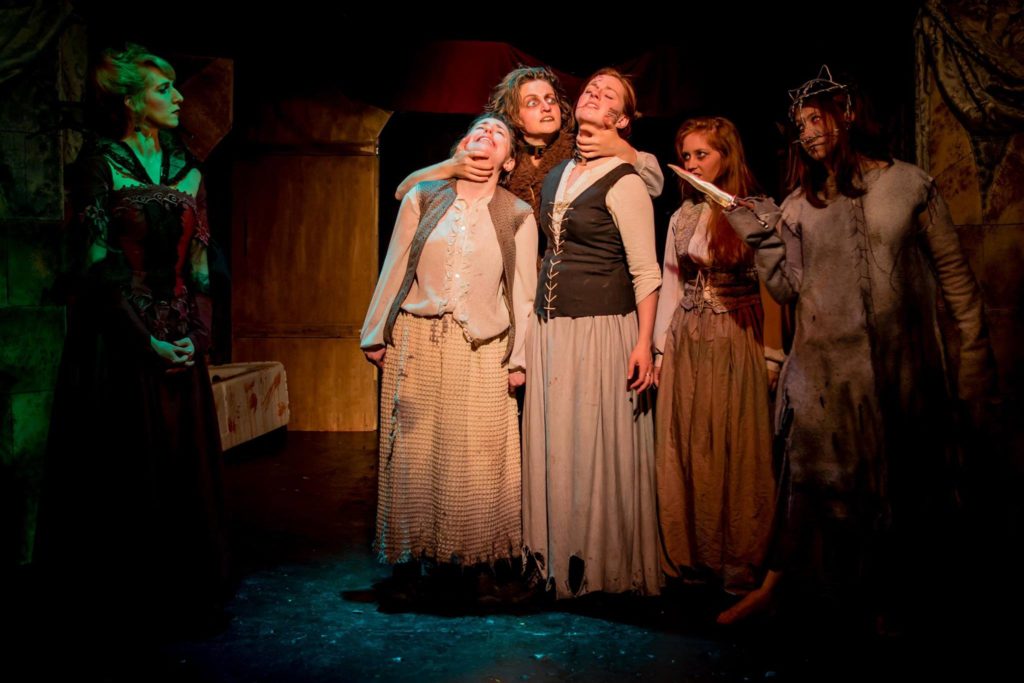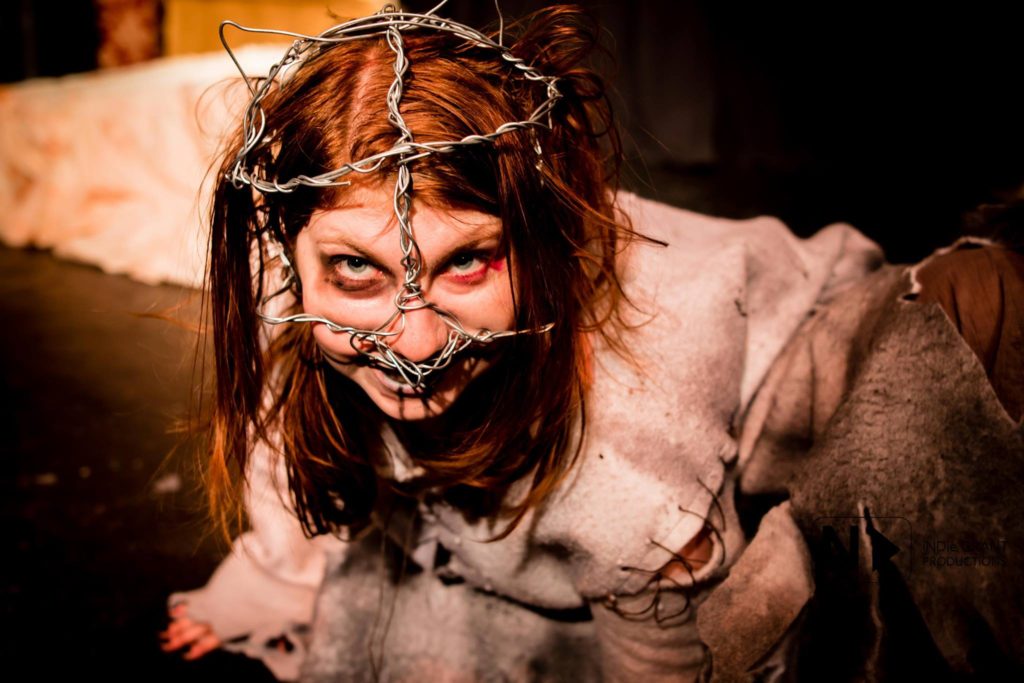
Juliana Brecher and Justin Verstraete as the Hapsberg Lords. Masks and lighting by Benjamin Dionysus. Costumes by Delena Bradley. Photo by iNDie Grant Productions
Act 2, Scene 2 of Countess Bathory is the longest scene in the play (just like 2.2 in Hamlet). It features several interludes that allow Elizabeth to display more varied aspects of her personality (again, like Hamlet). She spends a lot of time playing parts and pretending to be what she is not (again, Hamlet), but the scene begins and ends with moments of severe vulnerability.
The scene opens with a sonnet that Elizabeth speaks to herself and her mirror. She describes her physical form as peerless, yet still unfit for her immortal soul, and (reminiscent of Cat on a Hot Tin Roof), laments that the true tragedy is the awareness of one’s own limitations. She shares a brief moment with her husband where she is at perhaps her most vulnerable. She seems closer to abandoning her pride here than even at the play’s end, stopping just short of begging for her husband to stay with her. She remarks later in the scene that her knight has, “like a spiral,” bored into her heart. In her final moment of vulnerable intimacy before court begins, she shares a moment of nostalgia with her handmaiden Kate.

Elizabeth (Mary-Kate Arnold) and Kate (Aiyanna Wade) share one of their unusual moments of unity. Kate’s makeup design by Jay Megan Sushka. Lighting by Benjamin Dionysus. Costumes by Delena Bradley. Photo by iNDie Grant Productions
Kate has now become permanently scarred from her encounter with Bathory in Act 1, which makes it particularly cruel (no doubt premeditatedly so) that she is now charged with carrying Bathory’s mirror, so the Countess may examine her own beauty. It is telling and extraordinarily appropriate that in our production, Elizabeth’s entrance in a gorgeous new gown mutes the shock of Kate’s entrance, in her mutilated visage.
Elizabeth’s bizarrely intimate and unusually kind (most of the time) relationship with Kate begins here, but it is quickly shunted aside when matters of state emerge. Elizabeth must deal with the meddling Zavodsky, a witch-slash-charlatan, a new servant and acolyte, an adversary-turned-would-be-wooer, and of course the Hapsberg Lords.

‘Hapsberg Crest’ design by Joan Varitek
The Hapsbergs and Bathories were the two most powerful families in Hungary at the time. The Bathories were well established and the wealthier of the two, and Elizabeth’s marriage into the Nadasdy line helped to bolster their reputation. But the Hapsbergs (of the famous Hapsberg jaw) were largely undisputed in their primacy: not least of all because King Matthias II himself was of the Hapsberg line. So when a pair of Hapsberg Lords are sent to serve Bathory (in a pale echo of Rosencrantz and Guildenstern), they are understandably disenchanted with the idea.
The Hapsberg Lord scene was one of my earliest inventions, and a personal favorite. It was directly inspired by a scene in CS Lewis’ Voyage of the Dawn Treader, which itself was inspired by the Saint Crispin’s Day speech from Henry V. In Voyage of the Dawn Treader, Prince Caspian’s sea-journey to the edge of the world its nearing its end. The crew has arrived at a safe, comfortable resting point, and after all their many trials, none are anxious to set out again, despite being so close to their destination. Caspian’s most loyal followers warn him that the sailors are feeling mutinous, and he must be careful how he convinces them to continue. Caspian brilliantly responds: “Friends… I think you have not quite understood our purpose. You talk as if we had come to you with our hat in our hand, begging for shipmates. It isn’t like that at all. We and our royal brother and sister and their kinsman and Sir Reepicheep, the good knight, and the Lord Drinian have an errand to the world’s edge. It is our pleasure to choose from among such of you as are willing those whom we deem worthy of so high an enterprise. We have not said that any can come for the asking. That is why we shall now command the Lord Drinian and Master Rhince to consider carefully what men among you are the hardest in battle, the most skilled seamen, the purest in blood, the most loyal to our person, and the cleanest of life and manners… Do you think that the privilege of seeing the last things is to be bought for a song? Why, every man that comes with us shall bequeath the title of Dawn Treader to all his descendants, and when we land at Cair Paravel on the homeward voyage he shall have gold or land enough to make him rich all his life.” Instantly, the grumbling mutiny vanishes, and (almost) every sailor is desperate for the honor of doing what they were already compelled to do in the first place.
As a kid, this was the first time I read something and thought: “This is brilliant! Maybe reading is okay after all.” I had no idea at the time that it was based on the Saint Crispin’s Day speech, nor that Shakespeare would play such an enormous role in my life later on. Homage to an homage to an homage…
This book also contains the story of Eustice’s transformatin, which I won’t go into here, but which was a transformative experience for me. It continues to be so.
The Hapsberg Lords seem weirdly out of place, almost inhuman, in the scene. They are very much Brechtian caricatures, trying to be ‘human.’ Countess Bathory is awash with various creatures and constructs trying to be ‘human.’ Exactly what ‘human’ is, however, seems poorly defined, and this is particularly apparent in the lurching, muppet-like Hapsberg Lords.
2.2 is also a chance for the habitually, by turns, seductive and combative Elizabeth to show more humor and civil grace than we’ve seen to date (again, like Hamlet), and a rare moment in 2.2 where the plot is palbably moved forward. While Richard III‘s protagonist spends most of his time doing things and very little feeling things, Countess Bathory has large pockets spent revealing character, similar to Henry VI‘s exposure of the false miracles (or arguably the entire Jack Cade rebellion), and definitely like Hamlet’s interaction with the Players.
But while Hamlet discovers inspiration and shame when faced with the passion of the Players, leading up to his famous “The play’s the thing,” Elizabeth discovers fury and paranoia in the face of the prideful and duplicitous Hapsbergs. She is torn, not between action and inaction, but two demanding courses that each feel time-sensitive: protecting her husband’s lands and staving off mortal rot. She ignores Helena Jo’s comforts, which might well have led her to the practical solution (defending her lands). Kate then offers a rare moment of insight, advice, and perhaps even concern; love will kill you every time: ignore it or just let it kill you. Bathory once again ignores the concern of her loyal servants, and gives over to the machinations of the forest witch: divinity trumps reality.
“Nay, I will be tumultuous as Nature,
And sway and shock this Planet: I’ll astound
The angels with th’extent of my Wilderness.
I must protect our lands: nay, they are mine,
I hold my lands, bondwomen, allies, foes,
And ev’ry thing that’s in this World shall be
A Blossom for my plucking. It’s my Land,
And I’ll defend it with these holy Hands.”
COUNTESS BATHORY is back, Thursday – Saturday. Reservations are full, but walkups are welcome.
June 9 – 25
Thursday, Friday, and Saturday at 7:30pm
4001 N Ravenswood Ave, Ste 405
ALL SEATS ARE FREE








 Juliana Brecher was our final addition to the Countess Bathory cast. Among other roles, she plays the unfortunately fated and unfortunately named Susannah Woodseam.
Juliana Brecher was our final addition to the Countess Bathory cast. Among other roles, she plays the unfortunately fated and unfortunately named Susannah Woodseam.


